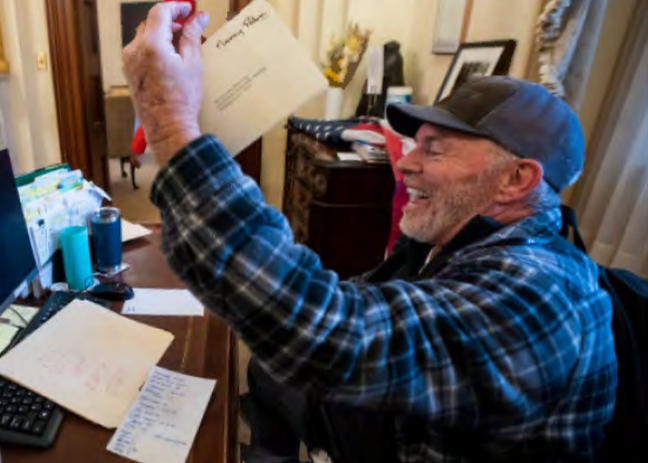WASHINGTON — Think of him as your “crazy uncle.” That is how Richard Barnett’s lawyer asked the jury to characterize the defendant in his U.S. Capitol riot trial.
“He’s not a domestic terrorist, but he is everyone’s crazy redneck uncle from out of town,” Joseph McBride, Barnett’s lead attorney, said during the defense’s opening statement Wednesday.
Barnett, a former firefighter from Gravette, Arkansas, has pleaded not guilty to eight charges for his role in the Jan. 6 attack on the Capitol. He began testifying in his own defense this morning.
The defense argued that Barnett, 62, was largely removed from the violence occurring at the Capitol on Jan. 6.
“Richard is entirely disconnected from what’s going on. All he cares about is his flag,” said McBride, referring to an interaction inside the Capitol Rotunda where police body camera footage captures Barnett yelling at Metropolitan Police Officer Terrence Craig to retrieve his flag from former-House Speaker Nancy Pelosi’s office.
McBride continued, “The evidence will show that while uncomfortable and rude and certainly in his personal space, [Barnett] did not impede Craig in any way.”
The defense affirmed its view that Barnett entered the Capitol “involuntarily,” after protesters in the building opened what are known as the Columbus Doors with little opposition from law enforcement. McBride said Barnett was pushed through the doors by the raucous crowd and then “paraded around for political purposes’”– all while acting as if he was “running around the hills of Arkansas,” the defense said.
As for the infamous photo of Barnett with his feet on a Pelosi aide’s desk, McBride said the man who snapped the photo, Saul Loeb, asked Barnett to “act natural” for the camera.
After the prosecution focused a large portion of its case around Barnett’s possession of a ZAP Hike n’ Strike stun device on Jan. 6 – FBI Special Agent Kimberly Allen even demonstrated the electric shock feature in court on Wednesday – the defense said in its opening statement that Barnett’s stun gun was “not working” at the Capitol.
While the defense acknowledged that Barnett was “not perfect” on Jan. 6, it said that there were plenty of “bad actors” and policing failures that contributed to stopping the certification process.
“The evidence will show that the electoral count was long disrupted before Barnett ever arrived on Capitol grounds,” McBride said, referring to the joint-session of Congress convened on Jan. 6 to certify the results of the 2020 presidential election.
Video shows Barnett entered the Capitol at 2:43 p.m. on Jan. 6, roughly 15 minutes after the House went into recess. But throughout its case, the United States argued that Barnett’s mere presence inside the Capitol on Jan. 6 was problematic.
“He came into the Capitol and we were not able to complete the work of Congress because he came into the Capitol,” said Emily Berret, Pelosi’s former deputy chief of staff, last Wednesday.
McBride said Barnett knew few details about the election certification process and, unlike many other rioters that day, didn’t verbally express any disdain for the key politicians involved, like former Vice President Mike Pence.
“He felt like America had been robbed and that the 2020 election was a knee on the throat of democracy,” McBride said.
The defense’s first witness Mark Snell, of New Mexico, testified on Wednesday afternoon. His wife Tammy Newburn and her cousin Eileen Halpin also testified Thursday morning. They spoke about Barnett’s reputation in the community.
“He’s a good man. Everyone needs a Richard in their life,” Halpin said.



